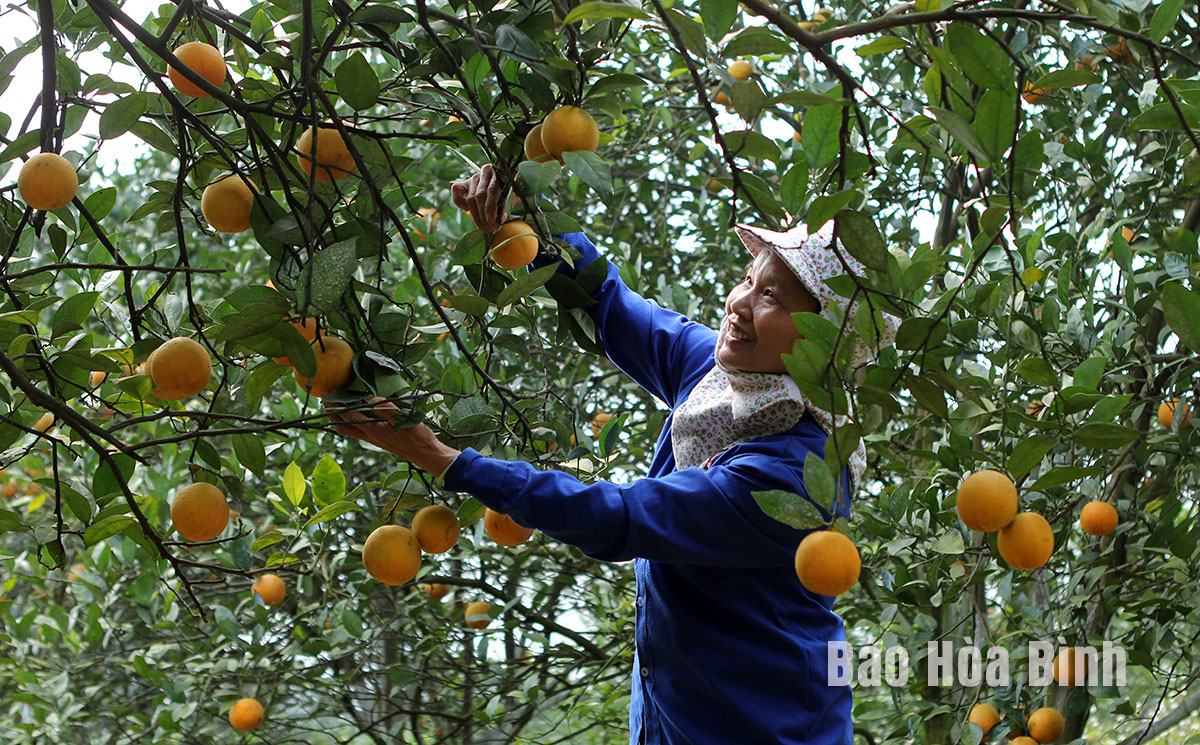
Fully tapping the advantages of climate, land, and farming tradition, Cao Phong district has promoted the development of citrus fruit growing areas into concentrated production ones, helping increase production value and bringing stable incomes to many households in the locality.
Statistics show that Cao Phong district has
over 1,740 ha of citrus fruit trees, including 1,357 ha of orange, 73 ha of
tangerine, 56.6 ha of lemon, and over 257 ha of pomelo. It is home to 179
hectares of orange cultivated in accordance with VietGAP standards, producing
over 20,000 tonnes in the 2023-2024 crop.
Cao Phong district is home to 179
hectares of orange cultivated in accordance with VietGAP standards.
All communes and the town in the district have
areas dedicated to citrus cultivation, mainly in Hop Phong, Tay Phong, Bac
Phong, and Thu Phong communes, and Cao Phong town.
Director of the Office of Agriculture and Rural
Development of Cao Phong district Bui Van Dan stated that to improve the value,
yield, and quality of citrus fruits, local farmers are focusing on applying
scientific and technological advancements in production and intensifying
investment to turn fruit cultivation into a key sector in the local
agricultural commodity structure.
Apart from maintaining the stable cultivation
areas, the office has advised the district People's Committee to instruct
localities to concentrate on intensive cultivation and improving the quality of
planting areas.
Localities have promoted citrus cultivation in
line with VietGAP and organic standards to turn out high-quality and safe
products that meet the increasing demand of domestic and export markets. In early 2023, the district exported nearly 7
tonnes of Cao Phong orange to the UK.
Dan said to sustainably develop citrus fruit
planting areas, Hoa Binh province has approved a project on replanting citrus
fruit trees for the 2021-2025 period with a vision to 2030.
To meet the domestic consumption and export
demand, the province will focus on producing specialty varieties with high
competitive advantages in each locality, expanding the application of good
agricultural production practices, towards 100% of products from concentrated
areas ensuring food safety standards, having growing area codes and
traceability.
Attention will be paid to promoting the
development of citrus fruit production and processing industry; and encouraging
businesses, especially large ones, to invest and link with farmers in the
citrus fruit value chain; and accelerating the formation of regional linkages
in producing, selling and exporting ci
trus fruit
products.
In Lac Thuy district, communes have been succeeded in promoting their One Commune-One Product (OCOP) products while others are still struggling to position their typical farming products in market. Some communes in the district still fail to have their products met OCOP programme’s requirements, while others have seen their certifications expired.
The inspectorate agency of Hoa Binh province has issued Official Dispatch No. 1090/TTr-PCTN to provincial departments, agencies, localities, business associations, enterprises, and investors regarding measures to improve informal component indexes of the Provincial Competitiveness Index (PCI).
Hoa Binh is taking concrete steps to improve its investment environment, with a strong focus on supporting businesses, settling obstacles for strategic investors, and creating opportunities for robust development in the coming years.
Under the blazing early summer sun, the construction site of Nhuan Trach Industrial Park (IP) in Luong Son district is abuzz with activities from dawn to dusk, a testament to the determination of the investor to meet their construction targets on schedule.



